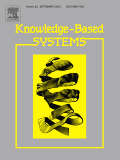
KNOWLEDGE-BASED SYSTEMS
Scope & Guideline
Advancing the Frontier of Intelligent Systems
Introduction
Aims and Scopes
- Knowledge Representation and Reasoning:
Research in this area explores how knowledge can be represented in a form that a computer system can utilize to solve complex tasks. This includes the use of ontologies, knowledge graphs, and logical reasoning systems. - Machine Learning and Data Mining:
The journal features studies on advanced machine learning techniques and data mining methods, focusing on their application to various datasets for classification, regression, and anomaly detection. - Artificial Intelligence Applications:
Papers often address the application of AI techniques in real-world scenarios, including healthcare, finance, and industrial processes, showcasing innovative solutions that enhance operational efficiency and decision-making. - Human-Computer Interaction:
Research on how knowledge-based systems can improve user experience and interaction, emphasizing the importance of explainability and user-centered design in intelligent systems. - Multi-Agent Systems:
The journal also covers the development of systems where multiple agents interact, focusing on cooperation, negotiation, and collective problem-solving strategies. - Optimization Techniques:
A significant focus on optimization methods, including evolutionary algorithms and reinforcement learning, applied to various engineering and computational problems.
Trending and Emerging
- Explainable AI (XAI):
A growing focus on explainability in AI systems, as researchers seek methods to make machine learning models more interpretable and understandable to users, particularly in critical applications such as healthcare and finance. - Federated Learning and Privacy Preservation:
An increasing number of studies are dedicated to federated learning, emphasizing privacy-preserving techniques that allow for collaborative learning without compromising sensitive data. - Integration of Multi-Modal Data:
Research is trending towards the integration of various data modalities (e.g., text, images, and audio) to enhance the performance of knowledge-based systems, particularly in sentiment analysis and recommendation systems. - Dynamic Graph Representation Learning:
Emerging interest in graph neural networks and dynamic graph representations to model complex relationships and interactions in data, especially for social networks and knowledge graphs. - Reinforcement Learning in Complex Environments:
There is a notable trend towards applying reinforcement learning techniques in complex, real-world scenarios, such as robotics and autonomous systems, where adaptive decision-making is crucial.
Declining or Waning
- Traditional Rule-Based Systems:
There is a noticeable decrease in publications focusing on traditional rule-based systems, as researchers increasingly favor more flexible and adaptive machine learning approaches that can handle uncertainty and large datasets. - Simple Statistical Methods:
The reliance on basic statistical methods is waning, with a shift towards more complex models that incorporate deep learning and other advanced techniques to tackle challenging problems. - Standalone Knowledge-Based Systems:
Research on isolated knowledge-based systems that do not integrate with machine learning or deep learning techniques is becoming less common, as interdisciplinary approaches gain traction.
Similar Journals
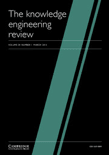
KNOWLEDGE ENGINEERING REVIEW
Advancing the Frontiers of Knowledge EngineeringKNOWLEDGE ENGINEERING REVIEW, published by Cambridge University Press, is a prestigious academic journal dedicated to the dynamic fields of Artificial Intelligence and Software Engineering. With an ISSN of 0269-8889 and an E-ISSN of 1469-8005, this journal has been a pivotal platform for scholarly communication since its inception in 1984, with its impact continuously recognized through its Q2 category ranking in both fields as of 2023. Operating from its headquarters in the United Kingdom, it boasts a robust Scopus ranking, placing it in the 73rd percentile for Software and the 69th percentile for Artificial Intelligence, a testament to its influence and relevance. Though it does not offer open access, the journal remains dedicated to advancing knowledge engineering by publishing high-quality research articles, insightful reviews, and innovative methodologies that address both theoretical and practical challenges. Researchers, professionals, and students find this journal an invaluable resource for cutting-edge developments in the realm of knowledge engineering.

Journal of Robotics Networking and Artificial Life
Navigating the Frontiers of Robotics and Artificial Life.Journal of Robotics Networking and Artificial Life, published by ALife Robotics Corp Ltd, stands at the forefront of interdisciplinary research at the intersection of robotics, artificial intelligence, and networking, representing a vital resource for scholars and practitioners in these rapidly evolving fields. Established as an Open Access journal since 2014, it provides unrestricted access to cutting-edge research and innovative methodologies, fostering collaboration and knowledge dissemination globally. Although it currently holds a Q4 ranking in both Artificial Intelligence and Computer Networks and Communications, its commitment to advancing knowledge through robust peer review and dedicated publication practices positions it as a growing contender within these spheres. With a publication history covering the years from 2019 to 2023, this journal emphasizes the importance of novel insights and cross-disciplinary approaches. Researchers, professionals, and students are encouraged to contribute to and engage with the evolving discourse in robotics and artificial intelligence, making the Journal of Robotics Networking and Artificial Life an essential addition to their academic and professional resources.
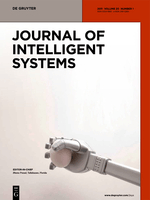
Journal of Intelligent Systems
Fostering Global Collaboration in Intelligent ResearchThe Journal of Intelligent Systems, published by DE GRUYTER POLAND SP Z O O, is a premier open access journal that has been at the forefront of advancements in the fields of Artificial Intelligence, Information Systems, and Software Engineering since its inception in 1991. With a commitment to disseminating high-quality research, the journal has been recognized in the 2023 category quartiles as Q3 in these critical areas, reflecting its relevance and impact in the academic community. The journal serves as a vital platform for researchers, professionals, and students interested in the evolving landscape of intelligent systems, offering insights into innovative methodologies and applications. As an open access publication since 2020, it ensures that research is readily available to a global audience, fostering collaboration and engagement within the scientific community. With a Scopus rank in the 65th to 69th percentiles across its categories, The Journal of Intelligent Systems continues to contribute significantly to the discourse on intelligent technologies and their implications for the future.

KNOWLEDGE AND INFORMATION SYSTEMS
Navigating the Evolving Landscape of Human-Computer InteractionKNOWLEDGE AND INFORMATION SYSTEMS, published by SPRINGER LONDON LTD, is a distinguished journal in the field of information systems, artificial intelligence, and human-computer interaction. With its ISSN 0219-1377 and E-ISSN 0219-3116, this journal has built a robust reputation since its inception, featuring a convergence of valuable research from 2005 through 2024. Catering to a diverse academic audience, it is classified among the leading journals in its category, proudly holding a Q1 ranking in Information Systems and Q2 rankings in multiple other domains. The journal aims to publish cutting-edge research that not only advances theoretical understanding but also provides practical applications within these rapidly evolving fields. Although it is not an Open Access journal, subscribers can access a wealth of knowledge critical for researchers, practitioners, and students looking to enhance their expertise. With a 2023 Scopus rank placing it within the 66th percentile for Information Systems, KNOWLEDGE AND INFORMATION SYSTEMS is an invaluable resource for those committed to pushing the frontiers of knowledge in technology and information science.

DATA & KNOWLEDGE ENGINEERING
Advancing the Frontiers of Data ManagementData & Knowledge Engineering is a prestigious, peer-reviewed journal dedicated to the fields of data management, information systems, and knowledge engineering. Published by Elsevier in the Netherlands, this journal serves as a critical resource for researchers, professionals, and students alike, offering a platform for high-quality, original research and innovative approaches in the realm of data-driven technologies and methodologies. With a considerable impact factor and classified in the Q2 quartile for Information Systems and Management, it ranks 47th out of 148 journals in its category, placing it in the esteemed 68th percentile according to Scopus metrics. Data & Knowledge Engineering covers a wide array of topics including database systems, data mining, and knowledge representation, ensuring that it remains at the forefront of advancing understanding and application in these dynamic fields. Engage with compelling articles and significant findings published since its inception in 1985, as the journal continues to shape the future of data-centric research up to 2024 and beyond.
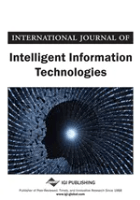
International Journal of Intelligent Information Technologies
Empowering Insights through Innovative Information Technologies.Founded in 2005, the International Journal of Intelligent Information Technologies serves as a pivotal platform for the dissemination of cutting-edge research in the fields of decision sciences and information systems. Published by IGI Global, this journal is dedicated to advancing the understanding of intelligent systems, data analytics, and technological innovations that drive modern decision-making processes. With an ISSN of 1548-3657 and an E-ISSN of 1548-3665, the journal is indexed strategically to ensure visibility among academia and industry professionals. Although it currently holds a ranking in the Q4 quartile of both decision sciences and information systems categories in 2023, it stands out for its comprehensive investigations into best practices and emerging trends in intelligent information technologies. It aims to provide readers with rigorous, peer-reviewed articles that offer practical insights and theoretical frameworks to facilitate informed decision-making in an increasingly data-driven world. Its commitment to quality research makes it an invaluable resource for researchers, professionals, and students alike who are eager to explore new dimensions of technology-assisted decision-making.
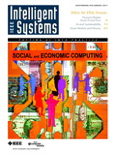
IEEE INTELLIGENT SYSTEMS
Pioneering Research in Machine Learning and BeyondIEEE Intelligent Systems, published by the renowned IEEE Computer Society, stands at the forefront of research in the fields of Artificial Intelligence and Computer Networks and Communications. With an impressive Q1 ranking in both categories as of 2023 and Scopus rankings placing it in the top 5% of its field, this journal not only showcases cutting-edge scientific advancements but also serves as a vital resource for practitioners, academics, and students seeking to deepen their understanding and application of intelligent systems. The journal covers a broad range of topics including machine learning, data mining, and system architectures, reflecting its commitment to addressing contemporary challenges and innovations in technology. Although it does not offer open access, the journal's research contributions are invaluable, ensuring that its readership remains engaged with the latest findings and applications in a rapidly evolving field. For those interested in submitting high-quality research or staying updated on the latest developments, IEEE Intelligent Systems represents an essential hub of knowledge.

Intelligent Data Analysis
Transforming Data into Knowledge for Tomorrow's InnovatorsIntelligent Data Analysis is a highly regarded journal published by IOS Press, specializing in the fields of Artificial Intelligence, Computer Vision, and Pattern Recognition. With its ISSN 1088-467X and E-ISSN 1571-4128, the journal has been a cornerstone of scholarly communication since its inception in 1997, serving as a vital resource for researchers, professionals, and students engaged in advancing methodologies and applications in intelligent data analysis. The journal maintains its significance with impressive Scopus ranks, indicating its notable position within the academic community. Although currently not an Open Access journal, Intelligent Data Analysis offers a wealth of insights and findings, encouraging collaboration and knowledge exchange among its readership. With an impact factor reflective of its rigorous selection processes, the journal traverses a broad range of topics, contributing to ongoing discussions and innovations in its field. As the journal looks toward shaping future research until 2024 and beyond, it remains a pivotal platform for disseminating cutting-edge research and fostering academic inquiry.
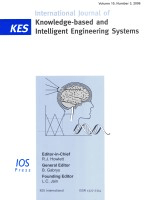
International Journal of Knowledge-Based and Intelligent Engineering Systems
Exploring the Synergy of AI and Engineering ExcellenceThe International Journal of Knowledge-Based and Intelligent Engineering Systems, published by IOS PRESS, serves as a vital platform for scholars and practitioners involved in the fields of Artificial Intelligence, Control and Systems Engineering, and Software Development. Founded in 2004 and continuously publishing through to 2024, this journal stands out with its comprehensive coverage of innovative methodologies and applications that leverage knowledge-based systems. Although currently listed in Q4 for Artificial Intelligence and Q3 for Control and Systems Engineering, it features an increasing trajectory in the scientific community, as indicated by its rankings in Scopus—which reflects the growing importance of intelligent engineering systems in contemporary research. With a commitment to disseminating cutting-edge research without open access constraints, this journal is essential for those seeking to understand and contribute to advancements in intelligent systems. Join a global community of researchers and industry leaders by engaging with the latest findings shared in this well-regarded journal.

International Journal of Semantic Computing
Transforming Knowledge Through Semantic InnovationThe International Journal of Semantic Computing is a premier scholarly publication focused on the intersection of artificial intelligence, computer networks, and linguistics, published by World Scientific Publishing Co PTE Ltd. Since its inception in 2007, this journal has strived to advance the field of semantic computing by promoting innovative research and interdisciplinary collaboration among professionals and academics. With a diverse scope that spans across various categories including Artificial Intelligence, Information Systems, and Linguistics, it boasts commendable rankings, particularly in the fields of Linguistics (77th Percentile) and Linguistics and Language (Rank #259/1167). The journal caters to a broad audience by offering critical insights and cutting-edge studies, thereby contributing significantly to knowledge enhancement in semantic technologies and computational linguistics. Although it does not offer open access options, its rigorous peer-review process ensures the publication of high-quality research that is invaluable for both researchers and students seeking to deepen their understanding in these rapidly evolving areas.